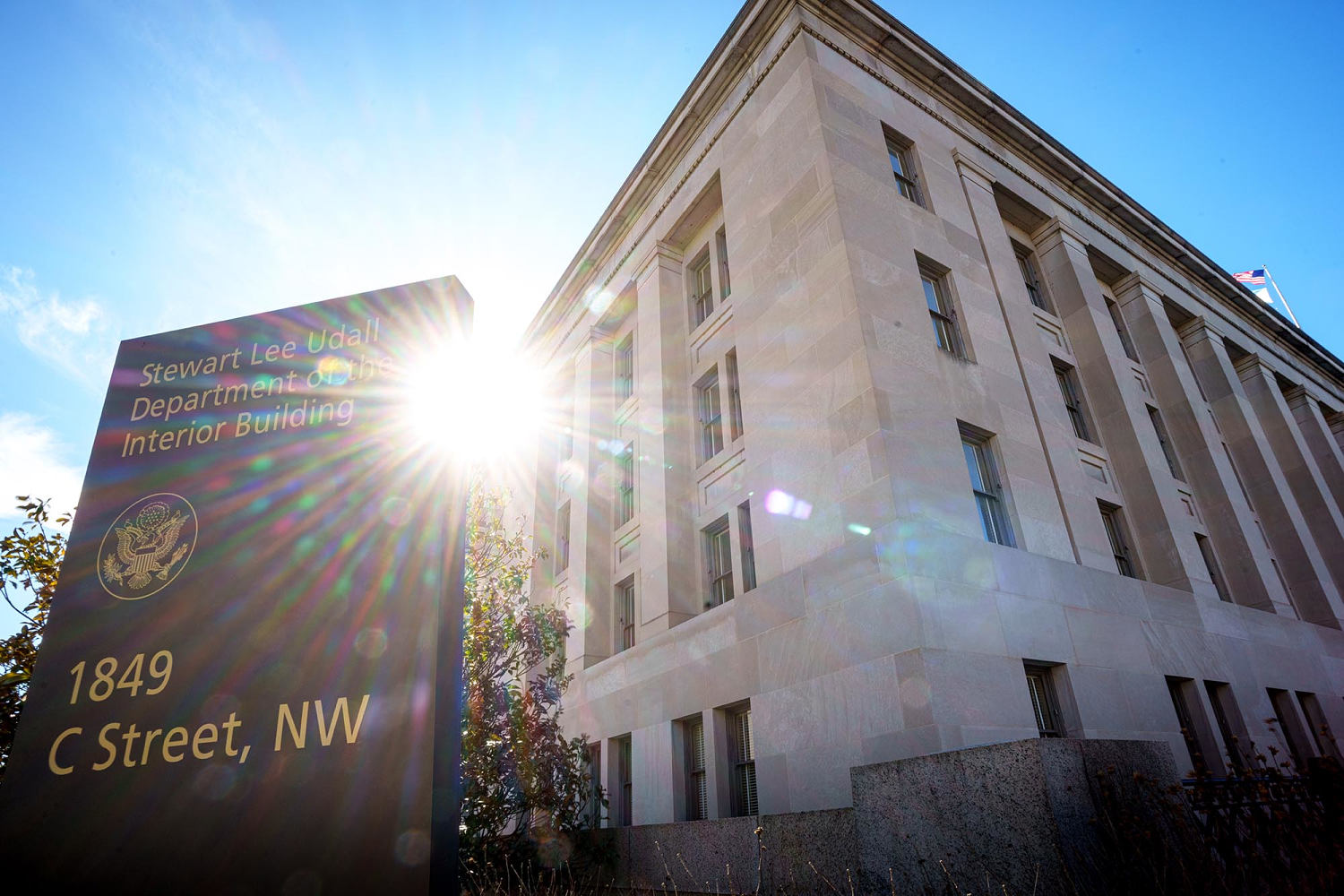The Dictatorship
My job was to make the government less wasteful. Then Trump fired me.

A recent audit found that Medicare may have made up to $454 million in improper payments to providers for 38.7 million Covid tests.
In another casea multiagency investigation found that a former U.S. Air Force employee and the owners of government contracting firms conspired in a bribery scheme that spanned more than a decade and involved more than $400 million in government contracts. The investigation led to six criminal convictions, more than $88 million recovered for the government and more than 34 years of jail time for the defendants.
IG oversight has collectively resulted in potential savings of about $93.1 billion in FY 2023.
A 2023 report revealed that the Small Business Administration had decided to stop collecting on certain delinquent loans — totaling roughly $62 billion. After the report was issued and congressional Republicans “blasted the [Biden] administration for its leniency,” the SBA reversed course and announced plans to pursue those deadbeat loans aggressively, and could recover as much as $30 billion for American taxpayers.
The reports mentioned above represent just a handful of the times inspectors general, the independent watchdogs inside the various agencies of the federal government, have either called out fraud or waste or saved the American people money. IGs have also improved the federal government’s performance on a wide variety of critical issues, from combating violent gangs to preventing veterans’ suicides, from uncovering cyberfraud to fighting cyberstalking, from overseeing U.S. aid to Ukraine to evaluating the evacuation from Afghanistan, from exposing border corruption to analyzing bank failures.
That’s why President Donald Trump’s decision to fire 18 inspectors general in the first week of his term is so puzzling. According to the Council of the Inspectors General on Integrity and Efficiency, IG oversight has collectively resulted in potential savings of about $93.1 billion in FY 2023. With the OIG community’s aggregate FY 2023 budget of approximately $3.5 billion, these potential savings represent an approximate $26 return on every dollar invested in inspectors general.
IGs should be a natural ally in the president’s effort to make the government more efficient; “Efficiency” is literally in our name. IGs ultimately share a mission with the rest of the executive branch, which is to improve the federal government for the American people. And the IGs’ track record makes clear that IG oversight is a good investment for the American taxpayer.
Even if it’s true, as some have argued that the White House fired me along with my IG colleagues because the president does not want independent oversight into the executive branch, here’s why President Trump should want independence for his inspectors general.
If IGs are not independent — if they can’t make findings of waste, fraud, abuse or misconduct about government programs, without fear of being fired, disciplined or reprimanded and can’t be objective in their assessments of government programs — then their oversight will be worthless.
The programs that President Trump cares about most are precisely the ones in which he should want the straight scoop.
To use a business analogy, President Trump would likely avoid investing in a company whose auditors were hopelessly conflicted, and he wouldn’t trust the financial audit of the company’s balance sheet or cash flow statement if the auditor would have gotten fired for anything other than a clean opinion. Surely, he wouldn’t trust a bond rating if the rating officials would have been fired or reprimanded for anything other than a AAA rating.
Similarly, who would believe any findings of any office of inspector general if IGs can be removed for any negative findings? The programs that President Trump cares about most are precisely the ones in which he should want the straight scoop.
This is not a hypothetical. In 2022, when I was inspector general of the U.S. Interior Department, my office found that the department’s Bureau of Land Management, which administers oil and gas leasing programs on federal land, was failing to conduct a necessary step to prevent waste, fraud and abuse in the leasing program. BLM was awarding leases for the mineral extraction, including oil and gas, without confirming whether the entities and individuals were prohibited from doing business with the federal government. After our report, BLM began immediately checking the list of prohibited entities before issuing those leases. That is a great example of government oversight at its best.
Here’s the catch: I don’t know that such a report could be issued today. There’s reason to believe that a negative report on a sensitive program, regardless of how true it is or how helpful it is to the American taxpayer, would be viewed as disloyal and cause for termination.
The chilling effect on IGs seems already to be occurring. Paul Martin, who served as inspector general of the U.S. Agency for International Development was fired last monththe day after releasing a report that cautioned that the Trump administration’s freeze on foreign aid, as well as its efforts to cut USAID’s staffing, made it harder to ensure billions in U.S. funding were being spent properly. Roughly two weeks later, The Washington Post reported that his successor, the acting IG at USAID, had been accused of holding “two critical reports on the consequences of President Donald Trump’s funding freeze on crucial services in Africa and the Middle East, amid fears of retaliation from the White House.”
That is the polar opposite of what President Trump should want. He should want to know if there are problems in the federal government, so he can fix them for the American people. IG reports are a tremendous tool to do just that, but only if the IGs are empowered to call it like they see it, without the proverbial sword of Damocles hanging over their heads.
President Trump is famously adamant about loyalty. Well, it’s not loyal to bury bad news. To the contrary, allowing decision-makers to waltz down the primrose path, unwittingly blind to the realities on the ground, is the ultimate in disloyalty. Sharing the truth, even if it is not what the principal wants, is the ultimate show of loyalty.
Mark Greenblatt
Mark Greenblatt was inspector general of the Interior Department from August 2019 until January 2025. He also served as chairman of the Council of the Inspectors General on Integrity and Efficiency from 2023 to 2024 and as vice chair from 2022 to 2023.
The Dictatorship
Man arrested for assaulting congressman at Sundance Film Festival

PARK CITY, Utah (AP) — A man was arrested Friday night at a party during the Sundance Film Festival in Park City, Utah, for allegedly assaulting a Florida congressman.
Democratic U.S. Rep. Maxwell Frost wrote on X on Saturday that he was punched in the face by a man who told Frost that President Donald Trump was going to deport him. The altercation occurred at a private party hosted by talent agency CAA at the High West Distillery, a popular venue for festival-adjacent events.
“He was heard screaming racist remarks as he drunkenly ran off,” Frost wrote. “The individual was arrested and I am okay.”
Frost, the first Gen Z member of Congress, thanked the venue security and the Park City Police Department for their help. A Park City Police Department representative said officers arrived on the scene just after midnight.
Christian Joel Young, 28, was arrested on charges of aggravated burglary, assaulting an elected official and assault and transported to Summit County Jail, according to court records.
Young appeared to have crashed the party by jumping a fence and had a Sundance Film Festival pass that was not issued in his name, according to the police affidavit.
It was unclear if Young had an attorney who could speak on his behalf. The Associated Press left messages with the Summit County Sheriff’s office and Utah courts in an attempt to request comment from Young or a lawyer.
Stay up to date with the news and the best of AP by following our WhatsApp channel.
The Sundance Film Festival representatives released a statement saying that they “strongly condemn” the incident, noting that while it occurred at a non-affiliated event that the behavior is “against our values of upholding a welcoming and inspiring environment for all our attendees.”
“The safety and security of our festival attendees is always our chief concern, and our thoughts are with Congressman Frost and his continued well-being,” the statement read. “We encourage anyone with additional information on this matter to contact the Park City Police Department.”
County Judge Richard Mrazik ordered Young held without bail, on the grounds that he would constitute, “a substantial danger to any other individual or to the community, or is likely to flee the jurisdiction of the court if released on bail.” Young has a prior misdemeanor conviction, according to court records.
Utah Gov. Spencer Cox, a Republican, denounced the alleged attack and said he won’t let tensions over immigration enforcement in places like Minneapolis spill into Utah.
“Political or racially charged violence of any kind is unacceptable in Utah,” Cox said in a statement. “I’m grateful to local law enforcement for swiftly apprehending the assailant and pursuing justice for Rep. Maxwell Frost.”
Federal immigration enforcement efforts are “welcome and necessary,” he added.
House Minority Leader Hakeem Jeffries wrote on X that he was horrified by what had happened and that “the perpetrator must be aggressively prosecuted.”
“Hate and political violence has no place in our country,” Jeffries continued.
Messages seeking comment were left for representatives for CAA.
___
Associated Press writer Hannah Schoenbaum contributed.
___
For more coverage of the 2026 Sundance Film Festival, visit: https://apnews.com/hub/sundance-film-festival
The Dictatorship
Amanda Gorman honors Alex Pretti in new poem

Amanda Gorman shared a powerful poem on Instagram that she wrote in honor of Alex Pretti, the 37-year-old ICU nurse and U.S. citizen killed by a federal immigration officers in Minneapolis, Minnesota, on Saturday.
The poem, “For Alex Jeffrey Pretti,” characterizes Pretti’s killing as a “betrayal” and an “execution.”
Gorman, earlier this month, also paid tribute to Renee Nicole Good, another U.S. citizen killed by a federal immigration officer in Minneapolis on Jan. 7. In a caption accompanying another poem shared on Instagram, Gorman said she was “horrified by the ongoing violence that ICE wages upon our community. Across our country, we are witnessing discrimination and brutality on an unconscionable scale.”
Her poem says, in part: “You could believe departed to be the dawn/ When the blank night has so long stood./ But our bright-fled angels will never be fully gone,/ When they forever are so fiercely Good.”
The 27-year-old writer and activist famously recited her poem, “Blue Light News We Climb,” at Joe Biden’s presidential inauguration in 2021. Gorman has also written poems in the wake of other tragedies in the country, including “Hymn for the Hurting,” about the Robb Elementary mass shooting in Uvalde, Texas in 2022. She also performed a poem she wrote about reproductive rights and the Roe V. Wade Supreme Court case in a NowThis video in 2019.
Erum Salam is a breaking news reporter and producer for MS NOW. She previously was a breaking news reporter for The Guardian.
The Dictatorship
Ted Cruz bashes Vance and Trump in secret recordings
Sen. Ted Cruz, R-Texas, in recordings obtained by Axiosseems to have a bone to pick with Vice President JD Vance and sometimes, President Donald Trump.
In his remarks, which lasted about 10 minutes and were reportedly made in a private meeting with donors sometime last year, Cruz portrays himself as an economically-minded, pro-interventionist who has the president’s ear.
The Texas senator is also heard criticizing former Fox News personality, Tucker Carlson, and his relationship with the vice president. “Tucker created JD. JD is Tucker’s protégé, and they are one and the same,” Cruz told donors.
Cruz, who has clashed with Carlson in the past over foreign intervention policies, bashed the administration’s appointment of Israel critic Daniel Davis to a top national intelligence position. A vocal supporter of Israel himself, Cruz called Davis “a guy who viciously hates Israel,” and credited himself with removing Davis from the job.
The Republican senator also blamed Vance and Carlson for ousting former national security adviser Mike Waltz over similar anti-interventionist sentiments related to Iran.
“[Waltz] supported being vigorous against Iran and bombing Iran — and Tucker and JD took Mike out,” Cruz said.

Cruz also said he has been trying to get the White House to accept a trade agreement with India, but claimed White House economic adviser Peter Navarro, Vance and “sometimes” Trump, are resistant.
Domestically, Cruz cautioned donors about Trump’s tariffs, which he said could result in severe economic and political consequences. Cruz is reportedly heard telling donors that he told the president “if we get to November of [2026] and people’s 401(k)s are down 30% and prices are up 10–20% at the supermarket, we’re going to go into Election Day, face a bloodbath.”
Cruz said a conversation he had with Trump about tariffs “did not go well,” and that Trump was “yelling” and “cursing.” Cruz said Trump told him: “F*** you, Ted.”
“Trump was in a bad mood,” Cruz said. “I’ve been in conversations where he was very happy. This was not one of them.”
In a statement about the recordings, a spokesperson for Cruz said he is “the president’s greatest ally in the Senate and battles every day in the trenches to advance his agenda. Those battles include fights over staffers who try to enter the administration despite disagreeing with the president and seeking to undermine his foreign policy” and that “these attempts at sowing division are pathetic and getting boring.”
In an email responding to MS NOW’s request for comment on Cruz’s reported statements, the White House did not address Cruz’s statements.
Erum Salam is a breaking news reporter and producer for MS NOW. She previously was a breaking news reporter for The Guardian.
-

 The Dictatorship12 months ago
The Dictatorship12 months agoLuigi Mangione acknowledges public support in first official statement since arrest
-

 Politics11 months ago
Politics11 months agoFormer ‘Squad’ members launching ‘Bowman and Bush’ YouTube show
-

 The Dictatorship5 months ago
The Dictatorship5 months agoMike Johnson sums up the GOP’s arrogant position on military occupation with two words
-

 Politics11 months ago
Politics11 months agoBlue Light News’s Editorial Director Ryan Hutchins speaks at Blue Light News’s 2025 Governors Summit
-

 The Dictatorship11 months ago
The Dictatorship11 months agoPete Hegseth’s tenure at the Pentagon goes from bad to worse
-

 Politics11 months ago
Politics11 months agoFormer Kentucky AG Daniel Cameron launches Senate bid
-
Uncategorized1 year ago
Bob Good to step down as Freedom Caucus chair this week
-

 Politics9 months ago
Politics9 months agoDemocrat challenging Joni Ernst: I want to ‘tear down’ party, ‘build it back up’




